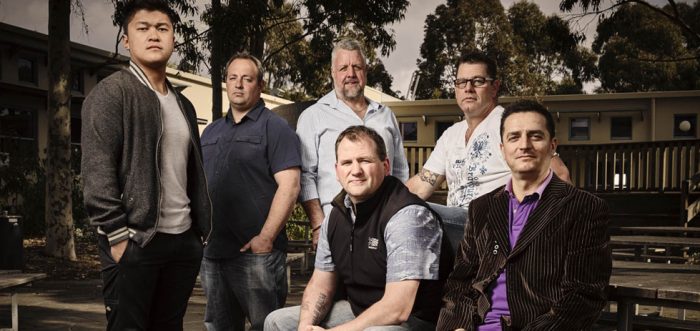
The opening images of Call Me Dad consist of suburban homes gliding by from a car window, in low light that transfigures them into a sprawl of shadows. Voices of mothers play over these, recounting times in which they were the victims of terrible violence inflicted by their partners. Here, director Sophie Wiesner turns these tranquil residences into a veil concealing lives led in fear. The focus of the documentary is not on anyone trying to hide these terrible transgressions, but what the male perpetrators at the centre are doing to confront their emotional problems, and break the internal cycles that have them act this way again and again. It would be unconscionable to try and disprove that those women bear the brunt of the epidemic, and Call Me Dad has zero interest in doing so. Instead, it contributes richly to the picture of the ongoing solution, by capturing the ornate complexities of every man’s road to redemption, and the loved ones whom they travel it for.
The point of focus is a recovery group named Heavy M.E.T.A.L., short for Men’s Education Towards Anger and Life. Much of the runtime is spent in the weekly “psycho-educational” meetings, co-ordinated by David Nugent and Jacqui Seamark, and it’s clear from the first of these that the pair have as much of a trial ahead of them in aiding these men as the men do in putting the lessons into practice. The three group members that are focussed on struggle in vastly different ways. Justin is a labourer with a deep lack of confidence, insisting that he can’t unlearn his habits overnight, and breaking the rules of drinking before a meet-up. He ploughs on for the sake of his son, whom he still might form a bond with. Nathan is a more boisterous and combative presence, chafing at the idea that people shouldn’t have to work hard on their own issues but blind to how uncomfortable he can make others, especially his two adolescent daughters, with even a casual comment. With both expressing dissatisfaction at the process, the third subject, Sasko, seems much more articulate and well-adjusted, appearing onscreen with his wife and espousing the virtues of the group, which he’s attended for years. Nonetheless, his demons are quite real, and a particular moment where they rear themselves again is especially devastating, but not without hope and consideration on the part of the filmmakers.
Nugent assures us that the group’s members have come from all walks of life, and there’s absolutely no reason to be skeptical of that. It still remains that the subjects of Wiesner’s film are exclusively men in heterosexual relationships, who carry some of the traits and mannerisms people think of when the word “bloke” is dropped; the taciturn, tattooed type who works long, hard hours and dismisses anxieties with a laconic “she’ll be right”. The film mercifully avoids reducing anyone exclusively to traits like these—much the opposite, as we see the meetings play out at an quick but understandable pace, which makes their complex behaviours and learning processes clear. Still, by choosing such subjects, it strikes at the heart of a very visible Australian identity that goes assumed and unchallenged. Every terse moment, euphemism and stolid gesture unique to Australian conversations swings like a wrecking ball either against their boundaries or back on themselves.
The idea of fatherhood is the guiding light for a lot of the men, because unlike the partners whose trust they’ve chosen to violate, their offspring still have a chance of developing full trust in them. Wiesener and company throw their weight behind this motivation, and while there’s little said for those who don’t have it, the wildly different circumstances for every individual is acknowledged—a divorcee makes a point of encouraging the still-married group members who are still with their partners, and Nugent even goes as far to say that some who walk into Heavy M.E.T.A.L. won’t ever be able to break their toxic habits. The good fortune of having any leverage in the recovery process is not lost on anyone.
These specificities doesn’t mean that Call Me Dad is pulling back its reach, but that it’s honing and redirecting it. To understand the participants’ circumstances, Wiesner and company widen their focus to question men’s partners, by capturing visits from a female counsellor/past victim and briefly visiting a corresponding women’s group. The men’s children also appear, and are remarkably calm in front of the camera, leading to some heartening displays of the progress they are making in rebuilding family bonds. The most touching moments are when the group leaders themselves unspool their histories of abuse: Nugent’s face sinks with regret talking about his last incident (“explosion” is shunned since it implies there is no choice or control involved—one of several false ideas they force themselves to burn), and Seamark’s own recount makes her an even stronger representative of the women that have been so mistreated; a responsibility that she takes very seriously.
The extent to which sheer depth and intimacy elevates Call Me Dad does have slight limits. Ending on footage of a street rally (a White Ribbon Foundation meeting, in this case) is fast becoming a tired cliche in documentaries, since the familiar faces that have carried us through the feature are ushered away by the filmmakers’ desire to go global. The fact that it feels gratuitous, though, is yet more testament to what Wiesner has done so well with the rest of the picture. This is a film as concerned with getting abuse victims the help they need as any vocal campaigner, and the real-world drama it captures to do so is a tactful and effective call for understanding that deserves to be seen.
